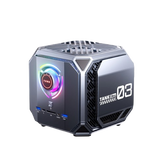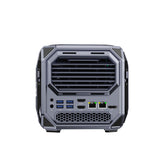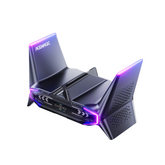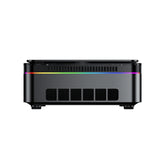AMD Ryzen 7 vs Intel Core i7: A Comprehensive Comparison

As two dominant forces in the market, AMD's Ryzen 7 series and Intel's Core i7 series processors have always attracted attention, sparking heated debates among consumers regarding the AMD Ryzen 7 vs Intel i7 comparison.
This article will delve into a detailed analysis of the standout models from these two series—AMD Ryzen 7 7800X3D and Intel Core i7-13700K. We will comprehensively compare these processors from multiple angles, including architecture, performance, power consumption, and pricing, helping you understand their respective advantages and suitable use cases.
Whether you are a gamer seeking to maximize your gaming experience or a content creator needing to handle multiple tasks efficiently, choosing the right CPU is crucial for enhancing both work and entertainment productivity. Let us explore the details of this performance showdown and discover which processor aligns better with your needs.
Specifications Comparison: AMD Ryzen 7 7800X3D vs Intel Core i7-13700K
| Specifications | AMD Ryzen™ 7 7800X3D | Intel® Core™ i7-13700K |
|---|---|---|
| Release Date | April 6, 2023 | Q4 2022 |
| Architecture | Zen 4 (3D V-Cache Technology) | 13th Gen Intel® Core (Raptor Lake) |
| Cores/Threads | 8 Cores / 16 Threads | 16 Cores (8 Performance Cores + 8 Efficiency Cores) / 24 Threads |
| Base Clock Speed | 4.2 GHz |
|
| Max Turbo Speed | Up to 5.0 GHz |
|
| Cache |
|
|
| Manufacturing Process | TSMC 5nm FinFET | Intel 7 (10nm Enhanced SuperFin) |
| Default TDP | 120W |
|
| Integrated GPU |
|
|
| Memory Support |
|
|
| PCIe Support | PCIe 5.0, 28 lanes (24 available) | PCIe 5.0 and 4.0, Maximum 20 lanes |
| Overclocking Support | Limited (due to 3D V-Cache restrictions) | Supported (Unlocked Multiplier) |
| Socket and Chipset |
|
|
| Key Features | Large L3 Cache for gaming performance | Hybrid architecture, high clock speeds, suitable for multi-thread workloads |
AMD Ryzen 7 vs Intel Core i7: Gaming Performance
According to game testing data from TechSpot, we conducted an in-depth comparative analysis of the performance of the AMD Ryzen 7 7800X3D and Intel Core i7-13700K processors across various games and resolutions.
Test Platform
-
AMD Ryzen 7 7800X3D
- Motherboard: GIGABYTE X670E Aorus Master (BIOS Version F11c)
- Memory: DDR5-6000 CL30
-
Intel® Core i7-13700K
- Motherboard: MSI MPG Z790 Carbon Wi-Fi
- Memory: DDR5-7200 (fully utilizing Intel processors' support for high-frequency memory)
- Graphics Card: ASUS ROG Strix RTX 4090 OC
- Test Resolutions: 1080p, 1440p, 4K
| Game Title | Resolution | Average FPS (AMD Ryzen 7 7800X3D) | Average FPS (Intel Core i7-13700K) | Performance Improvement of 7800X3D vs 13700K |
|---|---|---|---|---|
| Hogwarts Legacy (No Ray Tracing) | 1080p | 128 fps | 118 fps | ↑ 8% |
| Spider-Man: Remastered (No Ray Tracing) | 1080p | 17% faster than 13700K | - | ↑ 17% |
| Star Wars Jedi: Survivor | 1080p | 21% ahead | - | ↑ 21% |
| Resident Evil 4 | 1080p | 26% ahead | - | ↑ 26% |
| Watch Dogs: Legion | 1080p | 215 fps | 170 fps | ↑ 26% |
| Cyberpunk 2077 | 1080p | 3% slower than 13700K | slightly ahead | ↓ 3% |
In testing 25 games at 1080p resolution, the Ryzen 7 7800X3D averaged about 11% faster than the Core i7-13700K. In certain cache-sensitive games, the advantage of the 7800X3D exceeded 20%, such as in Star Wars Jedi: Survivor and Watch Dogs: Legion. The only instance where the 7800X3D lagged was in Cyberpunk 2077, where it was roughly 3% slower than the 13700K.
In the 1440p resolution tests, the 7800X3D still maintained a lead, averaging 8% faster than the 13700K. However, at 4K resolution, the performance of both processors was largely comparable. As resolution increases, games become more GPU-dependent, which narrows the performance gap between CPUs since the GPU becomes the primary bottleneck. Only in a few CPU-intensive games did the 7800X3D maintain a slight advantage.
AMD Ryzen 7 vs Intel Core i7: Multithreading and Productivity Performance

| CPU Performance | Intel Core i7-13700K | AMD Ryzen 7 7800X3D |
|---|---|---|
| Average Single-Core Score | 222 Points | 193 Points |
| Average Dual-Core Score | 444 Points | 379 Points |
| Average Quad-Core Score | 888 Points | 741 Points |
| Average Octa-Core Score | 1,676 Points | 1,360 Points |
When it comes to multithreading and productivity performance, the Intel Core i7-13700K demonstrates superior capabilities. According to UserBenchmark's test data, the i7-13700K outperforms the AMD Ryzen 7 7800X3D across average single-core, dual-core, quad-core, and octa-core scores.
This performance gap primarily stems from the i7-13700K's greater number of cores and threads, which enhances its performance in highly multithreaded tasks such as video editing, 3D rendering, and compilation. While the Ryzen 7 7800X3D has fewer cores, its strong single-core performance is sufficient for most productivity requirements. However, in extreme multithreaded applications, the Ryzen 7 7800X3D may lag slightly behind the i7-13700K.
AMD Ryzen 7 vs Intel Core i7: Power Consumption and Cooling
In terms of power consumption and thermal characteristics, the Intel Core i7-13700K and AMD Ryzen 7 7800X3D exhibit distinct traits. Though the Core i7-13700K excels in multithreaded performance and is suited for intensive productivity tasks, it also incurs higher power consumption and cooling demands. The base power consumption of the i7-13700K is 125W, but under maximum turbo conditions, it can spike to 253W. Such high power consumption means that the processor generates a significant amount of heat during operation, necessitating high-end cooling solutions like premium air coolers or water cooling systems to maintain stable performance under load.
In contrast, the Ryzen 7 7800X3D has a default TDP of 120W, but it demonstrates lower power consumption and thermal output in practical usage. This simplifies its cooling requirements, eliminating the need for expensive or complex cooling setups. The lower power consumption not only curtails energy costs but also decreases system noise and cooling component expenses. For users focused on energy efficiency and who prefer robust performance with lower power usage and easier thermal management, the Ryzen 7 7800X3D presents a more balanced option.
AMD Ryzen 7 vs Intel Core i7: Memory and Platform Support
| Memory Performance | AMD Ryzen 7 7800X3D | Intel Core i7-13700K |
|---|---|---|
| Average Memory Latency | 95.4 Points | 84.7 Points |
According to UserBenchmark's comparison data, the average memory latency score of the Core i7-13700K is 84.7 points, while the score of the Ryzen 7 7800X3D is 95.4 points (the higher the score, the better the performance). Therefore, the AMD Ryzen 7 7800X3D is better than the Intel® Core i7-13700K in memory latency performance, which may bring better game frame rates and higher work efficiency.
- Ryzen 7 7800X3D supports DDR5 memory, and the AM5 platform is expected to have a longer lifecycle, providing better future upgrade potential.
- Core i7-13700K is compatible with both DDR4 and DDR5 memory, offering users more choices, especially for those looking to utilize existing DDR4 memory to lower upgrade costs. However, Intel generally changes sockets after a few generations, meaning future upgrades may necessitate a new motherboard.
Also Read: DDR5 vs LPDDR5X: Speed, Gaming Performance & Which is Better
AMD Ryzen 7 vs Intel Core i7: Overclocking Capability
Overclocking (OC) Score Comparison
| Memory Performance (OC) | Intel Core i7-13700K | AMD Ryzen 7 7800X3D |
|---|---|---|
| OC Memory Latency | 93.4 Points | 99.1 Points |
| CPU Performance (OC) | Intel Core i7-13700K | AMD Ryzen 7 7800X3D |
|---|---|---|
| OC Single-Core Score | 230 Points | 200 Points |
| OC Dual-Core Score | 459 Points | 397 Points |
| OC Quad-Core Score | 915 Points | 790 Points |
| OC Octa-Core Score | 1,781 Points | 1,541 Points |
In terms of overclocking capability, the Intel Core i7-13700K clearly outshines the AMD Ryzen 7 7800X3D. According to the overclocking score comparison, the i7-13700K achieved higher scores across all tested metrics (higher scores indicate better performance). Specifically, the OC memory latency score for the i7-13700K is 93.4 Points, while the Ryzen 7 7800X3D is rated at 99.1 Points. In CPU performance testing post-overclocking, the i7-13700K's scores in single-core, dual-core, quad-core, and octa-core tasks are 230 Points, 459 Points, 915 Points, and 1,781 Points, respectively, all surpassing the Ryzen 7 7800X3D's corresponding scores of 200 Points, 397 Points, 790 Points, and 1,541 Points.
This difference primarily arises from the architectural designs and overclocking features of the two processors. The Ryzen 7 7800X3D employs 3D V-Cache technology, which is sensitive to voltage and thus limits its overclocking abilities, making significant overclocking operations not advisable. Conversely, the Core i7-13700K features an unlocked multiplier, providing greater overclocking potential suitable for experienced users looking to tweak parameters for enhanced performance. Therefore, if you're aiming to achieve higher performance through overclocking, the i7-13700K is the more favorable option.
Conclusion and Recommendations

Choosing a processor should be based on individual needs and use cases. If your primary requirement is the best gaming performance and higher energy efficiency, the AMD Ryzen 7 7800X3D is the ideal choice. Conversely, if you need to balance gaming with professional applications and desire flexible memory options, the Intel® Core i7-13700K may be more suitable. Below are recommendations for different types of users:
-
Gamers: If your main focus is gaming performance, particularly at 1080p and 1440p resolutions, the Ryzen 7 7800X3D is the better option, offering higher frame rates and lower power consumption.
-
Content Creators: If you handle a significant amount of multithreaded tasks, such as video editing and 3D rendering, the Core i7-13700K's multicore performance may be more advantageous.
-
Power Consumption and Cooling: For users with high demands for energy efficiency and thermal management, the 7800X3D offers superior benefits.
-
Budget Considerations: It’s important to factor in the overall platform cost, including the motherboard and memory. The 13700K is compatible with DDR4 memory, which may reduce upgrade expenses.
Regardless of which processor you choose, it's essential to consider the overall system configuration, including motherboard compatibility, memory speed, cooling solutions, and budget, to build a high-performance PC that best meets your needs.
References and Further Reading
[1] Intel Core i7-13700K Benchmarks [Cited 2024 December 11] Available at: Link
[2] AMD Ryzen 7 7800X3D Benchmarks [Cited 2024 December 11] Available at: Link
[3] Intel® Core i7-13700K Processor - Intel [Cited 2024 December 11] Available at: Link
[4] AMD Ryzen 7 7800X3D Gaming Processor - AMD [Cited 2024 December 19] Available at: Link
[5] Ryzen 7 7800X3D vs Core i7-13700K: What's the Best $400 CPU for Gaming? [Cited 2024 December 11] Available at: Link
[5] UserBenchmark: AMD Ryzen 7 7800X3D vs Intel Core i7-13700K
[Cited 2024 December 11] Available at: Link
[6] UserBenchmark: AMD Ryzen 7 7800X3D vs Intel Core i7-13700K
[Cited 2024 December 11] Available at: Link
Related articles
Amd Ryzen 5 vs Intel i5: Differences & How to Choose
Intel Celeron Processor vs Pentium: Key Differences and Best Use Cases
Ryzen 7 5700X vs. Ryzen 5 5600X: Choose the Best Processor For you







Leave a comment
Please note, comments need to be approved before they are published.